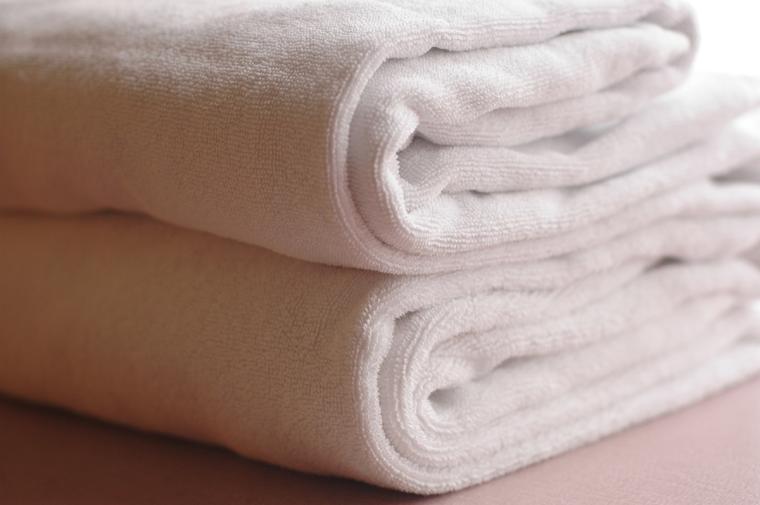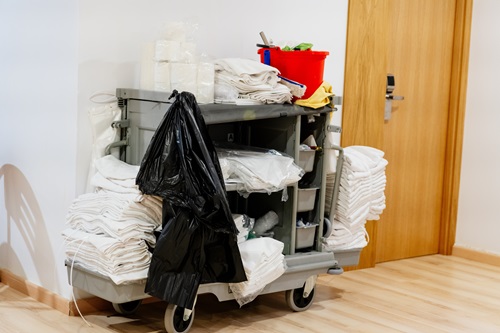
Photo © Ahmad Faizal Yahya | Dreamstime.com
Towel theft from hotels (along with larceny of terrycloth robes and plenty of other items) used to cause enormous losses in the hospitality sector.
In fact, according to an article in Huffington Post, which was quoting a hospitality survey, hotels lose five to 20 percent of their towel inventory in any given month because guests use what is known as the five-finger discount.
A recent Travelocity poll of hotel guests in the U.S. and Canada found that 85 percent of them had taken toiletries or towels from a hotel room.
We’ll set aside the toiletries issue for now, particularly since increasingly, hotels are replacing single-use miniature plastic toiletry bottles with full-size refillable dispensers that are attached to walls in hotel shower stalls and bathrooms. But the towel theft issue has persisted. And for a long time, it was an irritating, though unavoidable fact and was often chalked up to the cost of doing business.
That is, until technology caught up.
Now, hotels are fighting back, embedding washable RFID (radio-frequency identification) security chips in their towels and other textiles.

In View from the Wing, a photo shows a sign in a European hotel that informs guests:
We inform you that all of our towels are equipped with an invisible localizable chip from the RFID system. The towels cannot be carried out of your room. In the event that the towels do not remain in the hotel, the company reserves the right to report you to the relevant agency with fines from €300.00 to €15,000.00.
That’s between $350 and $17,700, by the way. Yes, for towels. Hoteliers say it’s long overdue.
Sometimes, the article notes, it’s just the warning itself that deters would-be thieves. A single hotel reported to the writer that it has saved $16,000 per month by reducing its towel thefts each month, from 4,000 occurrences down to 750.
RFID tags can be attached to virtually anything, which makes them an excellent means for tracking other items that people have been known to take from hotel rooms, like artwork, bedclothes, phones, ice buckets, toilet seats, clock radios, glassware, pillows, coffee machines, lamps and blankets as well as those great terrycloth robes with the hotel logo. Coffee table books about the destination, found in rooms at many high-end hotels, are also often considered fair game, as are other oddly specific documents like room service menus. Then there are the truly outlandish theft repports.
The article notes, “We’ve heard about a grand piano stolen from a Sheraton lobby, and about guests who steal televisions from their room. And would you believe: carpet, light fixtures, curtains and mirrors? Even door hinges have been stolen. The Four Seasons Beverly Wilshire (the Pretty Woman hotel) had a fireplace stolen.”
Hotel managers have noted the necessity of putting stanchions and roping around Christmas trees to keep ornaments from being picked off. Flower arrangements and green plants are also frequently snatched, as are catering supplies of all types.
And people thought it was an outrage when, not that long ago, budget motels started bolting their remotes to the nightstand.
Psychologists say that in some cases, people are trying to rationalize their thefts by noting the high cost of a room or the addition of resort fees to the total bill. Neither one of those will hold up as a legal defense, by the way.
According to AS, sensors placed at hotel exits and in laundry areas automatically detect if any tagged items are being taken off the property. Guests are then charged for the item(s) the same way they would if a beverage or snack were taken from the minibar.
The article notes, “Some hotels have already implemented this system with clear language in the lodging agreement: “Any missing item that is part of the room inventory may be charged.” Many guests realize this only after the fact, when they receive an email entitled: “Did you forget something in your room?” This is followed by a cheeky message: “One towel = $35.”

Yes, $35. Hotels aren’t messing around here. You play, you pay.
Spas and gyms have started implementing RFID tags as well, since their towels also tend to travel out in patrons’ gym bags.
Some hotels have begun to ban guests who make a habit of stealing items from their rooms. This can apply to repeat guests who steal small items, or it can apply to a guest who removes a high-ticket item.
Still, there are some items that still seem to be fair game. Extra rolls of toilet paper and boxes of tissue often vanish when guests check out. But as technology continues to improve, that too may become a thing of the past.

